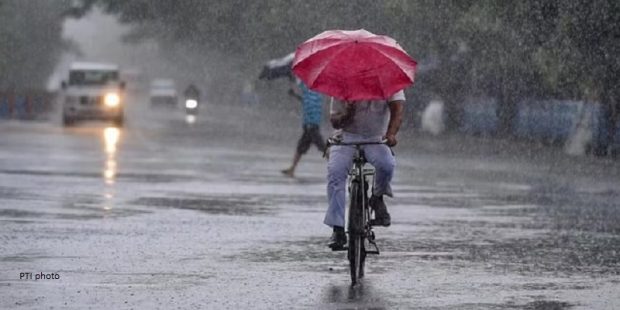
IMD plans to use AI to better forecasts; admits predicting severe weather events challenging
PTI, Jan 13, 2024, 3:39 PM IST

Image for representation
As it celebrates 150th year of its establishment, the India Meteorological Department (IMD) has now set its eyes on fine-tuning its weather forecast models using artificial intelligence and faster supercomputers even though it struggles to predict small-level severe weather events.
In an interview with PTI, IMD Director General Mrutyunjay Mohapatra said the weather office was setting up test beds in Odisha and Madhya Pradesh to better understand the physical processes leading to the formation of thunderstorms and heavy monsoon rains which could eventually help improve forecasts.
The IMD will kick start its 150th-anniversary celebrations on Monday with the launch of ‘Panchayat Mausam Seva’ that aims to take weather forecasts to every farmer in every village and the National Framework for Climate Services to mainstream climate information in every sector and activity.
Mohapatra said from issuing cyclone warnings at the Kolkata port in the late 19th century to issuing nowcasts that reach the mobile phones of users, the IMD has come a long way and now plans to use the latest advancements in artificial intelligence (AI) and machine learning (ML) to improve its forecasting capabilities.
“Being an old organisation, IMD has weather data since 1901 which has been digitised. AI is data science where we can utilise all this historical data to develop tools and methods for forecasting,” he said.
Mohapatra said the IMD has formed an expert group on AI-ML and was also collaborating with NITs, IITs, IIITs, academic and R&D institutions for joint development of tools which can be used to improve forecast accuracy and sectoral applications.
“Nowcast can be a very good area where AI/ML can contribute significantly to improve decision-making and weather forecasting. Similarly, in the short to medium range forecast, in the models itself AI/ML can work and improve weather forecasts by the models and hence finally by the forecasters,” he said.
The IMD chief said the weather office was also upgrading its high-performance computing systems to improve its numerical modelling capability.
“The Ministry of Earth Sciences (MoES) is in the process of procuring high-performance computing systems. Our capacity will increase from 10 petaflops to 30 petaflops. With that, the numerical model runtime, resolution, and post-process data generation will improve,” he said.
The faster supercomputers will help the IMD generate more sector-specific and location-specific information.
“At present, the IMD-MoES weather modelling system has a resolution of 12 kilometres. The target is to make it six kilometres. Similarly, the resolution of the regional modelling system will be improved from three kilometres to one kilometre,” he said.
Asked about the flak the weather office faced for inaccurate forecasts of heavy rainfall in southern Tamil Nadu in December, Mohapatra admitted that the forecasting system was not capable of predicting phenomena such as cloudbursts and small-level severe weather events.
“I encourage criticism. There should be criticism so that we learn the lessons and improve our forecasting system. But, still, there are certain challenges such as the cloudburst phenomenon, rainfall of 60 cm-90 cm is in very exceptional cases. The system is not capable of predicting such types of weather systems at present,” Mohapatra said.
He said India had its first weather observatory in 1793 in Chennai and the IMD was formally set up when Henry F Blanford took charge as the first Imperial Meteorological Reporter on January 15, 1875.
“We have come up a long way. We have come up with a very extended observational system not only at the surface of the earth but also at the upper atmosphere, in remote areas like seas, hill areas and deserts. But, still, there are some misses like the cloudburst phenomenon, lighting and very small-level severe weather events,” he said.
“So, there is still scope to improve the observational system so that each and every weather gets detected. Once you detect it, this information is used in a computing platform in the numerical prediction models for prediction purposes. So, prediction will also improve accordingly,” Mohapatra said.
He recalled that the two monstrous cyclones in the Bay of Bengal in 1864 that killed over 80,000 people and sank merchant ships of the then-British rulers and subsequent famines had led to the formation of the IMD.
Mohapatra said early warnings and forecasts issued by the IMD over the years have improved and there was very little loss of human life due to cyclones and heavy rains.
“The country is progressing, there has been early action based on the early warning issued by IMD. The country is going in that direction, forecast accuracy has increased by 40-50 per cent in the last five years compared to the previous five years,” he said.
“We have come up a long way, we have come up with understanding and I am sure the system will improve in the coming years to address all types of extreme weather events,” Mohapatra said.
Udayavani is now on Telegram. Click here to join our channel and stay updated with the latest news.
Top News

Related Articles More

Manmohan Singh preferred his Maruti 800 over BMW: UP minister recalls experience with former PM

Manmohan Singh made strategic corrections to India’s foreign policy: Jaishankar

National flag to be flown at half-mast during state mourning: Govt

Manmohan Singh: Architect of India’s economic reforms

‘In 2012, Manmohan underwent operations, never quite recovered physically’
MUST WATCH
Latest Additions

Manmohan Singh preferred his Maruti 800 over BMW: UP minister recalls experience with former PM

Mangaluru: Beach festival at Tannirbhavi on Dec 28, 29

Indian players wear black armband in memory of Manmohan Singh

Geethartha Chinthane 137: If house catches fire, grief is not for the fire!

Mangaluru/Udupi: Christmas and year-end festivities draw crowds to coastal beaches
Thanks for visiting Udayavani
You seem to have an Ad Blocker on.
To continue reading, please turn it off or whitelist Udayavani.


















